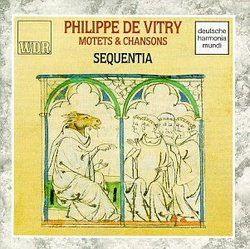REISSUED definitive portrait!!!!!!!!
Maddy Evil | London, UK | 05/22/2005
(5 out of 5 stars)
"This item has been reissued - you can buy it on the UK amazon site!!
This recording presents the 4 undisputed motets of Philippe de Vitry (1291-1361) [tracks 5, 13, 19, 20] alongside 9 others attributed to him, 2 organ intabulations and 5 monophonic courtly lyrics that may be of his authorship. The isorythmic motets (generally seen as epitomising the first Ars Nova developments) are certainly 'modern' compositions, employing all the features denounced by Jacques de Liege [c.1260-after 1330] (who defended Ars Antiqua principles in 'Speculum Musice'), including rapidly declaimed texts and 'hocketing' (fast upper-voice exchanges of notes and rests). The monophonic pieces here are in the Troubadour / Trouvere style (2 High Style chansons, 2 Low Style songs [1 lai and 1 descort]) and also point to the development of the virelai (the most familiar egs of which are by Machaut).
Sequentia's performances are brisk and crisply articulated, like their other interpretations of 13th and 14th century motets on CD (the de Vitry performances of Gothic Voices and the Orlando Consort are generally slower). In line with recent musicological research, the untexted parts are vocalised. The monophonic songs are also convincingly done, with sparse accompaniment that is sensitive and effective (vielle or harp, respecting their Troubadour/Trouvere origins).
In all, this is still the definitve recording of this repertoire. Bravo to DHM for finally reissuing it!!"

